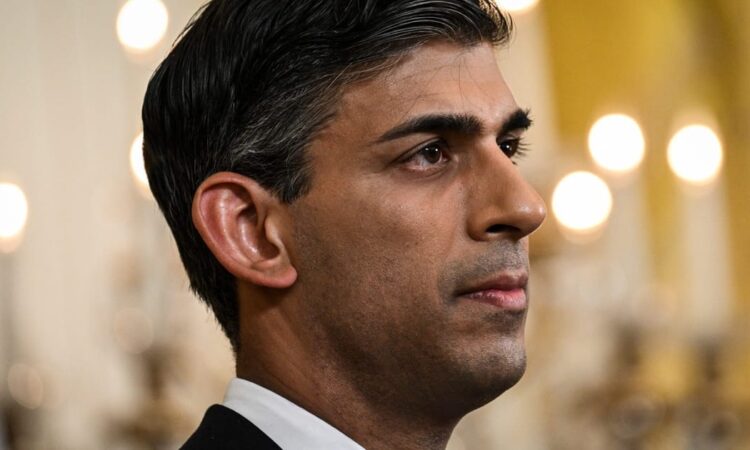
Press play to listen to this article
Voiced by artificial intelligence.
LONDON — Hundreds of thousands of Britons are facing mortgage misery over the next 12 months. Rishi Sunak is about to feel their wrath.
The U.K. prime minister has been snookered by Britain’s stubbornly high inflation rate, which at 8.7 percent remains the highest in Western Europe. The Bank of England is pushing interest rates ever-higher as a result, creating a crisis for U.K. homeowners not seen for a generation.
Around 800,000 households will need to remortgage their properties next year, the Resolution Foundation think tank calculates, and rising interest rates mean they will pay a staggering £2,900 a year more on average from 2024. With a general election looming next year, the timing for Sunak could hardly be worse.
This is a “huge problem” for voters, Andrea Leadsom, a Conservative member of the Commons Treasury committee and former U.K. business secretary, told POLITICO.
“It’s clear we’re going to lose the next election,” another former Cabinet minister sighed. “These are the voters we need. We can’t intervene or it will get worse, and the Bank of England were too slow to act to head it off. The goose is cooked — but it was cooked long ago.”
Yet both ex-ministers agreed with Sunak and his chancellor, Jeremy Hunt, that the U.K. government should not directly intervene to support those struggling to pay — despite an awareness they may be battered at the ballot box as a result.
Hunt told MPs this week that mortgage relief schemes would only “make inflation worse, not better.”
“Beating inflation has to be the priority,” Sunak will say in a speech on Thursday afternoon, shortly after the Bank announced rates were rising yet again, to 5 percent — a 15-year high. “If we don’t get a grip on inflation now, the damage will be worse and longer lasting.”
The one thing we didn’t want to happen
The impact of higher interest rates is particularly severe in Britain because of the large proportion of mortgages — 80 percent of existing deals and 90 percent of new ones — propped up by short-term fixed rates.
Britain’s mortgage woes have been further exacerbated by government support packages brought in over recent years to support the housing market, such as ex-Chancellor George Osborne’s Help-to-Buy scheme and Sunak’s own COVID-era stamp duty holiday, which critics say lured people into buying property with an illusion of affordability.
It’s hard to imagine any kind of hit to the nation’s personal finances presenting more of a nightmare for Sunak’s Conservative Party, given a mortgage crisis clobbers those he most needs to win over in 2024.
Younger voters — who have overwhelmingly supported Labour in recent elections — tend to be concentrated in cities in rented accommodation, while the majority of older voters who own their homes outright without mortgages are already locked-down Conservative voters.

“Then you’ve got this group in the middle, who have borne the brunt of food price rises, fuel price rises, and now interest rates as well,” says Paula Surridge, professor of political sociology at Bristol University. “They’re the group that both sides ought to be targeting. That’s definitely going to be a problem for the Conservatives.”
Adam Hawksbee, deputy director of center-right think tank Onward, characterizes this group as those who “bought their home on cheap finance, live in towns or satellite cities, and have been used to a good quality of life with a car and summer holidays — they will be most affected.”
While the heaviest burden is expected to fall in London and the south east, according to the Institute for Fiscal Studies, Surridge notes that mortgage rates are a problem not confined to wealthier voters but spread around the country.
A Conservative MP representing a relatively deprived constituency said: “There are poorer people in the seat who will be struggling — but there are more support schemes for them, and their overall expenses might be lower. But this mortgage stuff is going to hit the squeezed middle hard. It’s them I’m most worried about.”
A chancellor in No. 10
The crisis will be keenly felt by Sunak, who launched and eventually won his bid to lead the country with a pitch to steady the economy.
His promise to halve inflation by the end of the year now looks a tall order. But party observers — and Downing Street allies — say his only hope is to stick to the path he set out.
“I feel a deep moral responsibility to make sure the money you earn holds its value,” Sunak will say on Thursday. “That’s why our number one priority is to halve inflation this year … I’m completely confident that if we hold our nerve, we can do so.”

“There’s no one I’d rather have in No. 10 right now, because he’s so economically dry,” says Onward’s Hawksbee. “The government needs to hold the line and resist pressure to step in.”
Indeed, many Conservatives believe the U.K. has become overly reliant on the kind of big state interventions that became commonplace during the pandemic.
The irony is that it was Sunak himself — a politician who revels in his fiscally-conservative credentials — who drew up the multibillion-pound COVID assistance programs while serving as chancellor during the pandemic.
His famous March 2020 pledge — echoing European Central Bank President Mario Draghi — to do “whatever it takes” to shield U.K. households feels a long time ago.
“We can’t bail everyone out every time,” an ex-Treasury minister said. “And in this case, it’d just make things worse.”
So what can be done?
Sunak and Hunt’s only real action so far has been to summon the biggest mortgage lenders for a meeting this Friday, where they will be “reminded” of their obligations to borrowers.
Further direct action by the banks in the form of forbearance — agreeing to pause or reduce mortgage payments — seems unlikely, as it would merely offset the Bank of England’s efforts to rein in inflation.
The opposition Labour Party published its own five-point plan Wednesday night, urging new requirements on lenders to show leniency for those struggling to pay. But UK Finance, the body that represents British mortgage lenders, argues banks are already working with customers to find alternative solutions.
Mortgage lenders are keen to stress too that more radical measures, such as imposing mortgage holidays, would only kick the can down the road.
“They’re an option that still exists, but the interest does keep accruing so you end up paying back more than you would have done — a lot of people do not realize this,” said an industry communications person who was not authorized to speak publicly.
“The best plan would be to ignore the squealing and point to the decline in inflation everywhere apart from Britain, meaning rate rises here will end shortly anyway even with recent disappointments on inflation prints,” Meyrick Chapman, principal at Hedge Analytics told POLITICO.

This was echoed by Societe Generale’s uber-bear global strategist Albert Edwards, who said: “most economists would say it’s absolutely ridiculous to ameliorate the impact of rising interests on mortgage holders, as that would mean interest rates have to go even higher.”
Yet the scale of the crisis is such that pressure is now building on the government from inside the Conservative Party.
One former minister who worked directly with Sunak said: “Calls [for action] are growing. It’s not a full-on mass campaign or rebellion, but there are growing numbers of MPs who are concerned. I would have expected him to be much more front-footed, given the previous track record during COVID when he was very decisive.”
Former minister Jake Berry this week went public with a call for interest rate tax relief, as a way to defuse the “ticking time bomb.” Housing Secretary Michael Gove urged the banking sector to consider introducing 25-year fixed rate deals, putting the U.K. more in line with the long-term fixes offered to customers in the U.S. and Canada.
But Treasury Minister Andrew Griffith swiftly ruled out the first idea as unaffordable, while saying the second would only be achievable as a long-term project.
Structural factors are very different in the U.S., where long-term mortgages are in part made possible by the de facto underwriting of mortgages by quasi-governmental agencies which guarantee third-party loans. For the U.K. to normalize long-term mortgages, similar entities would likely have to be established — with possible consequences for Britain’s credit profile, and so the pound.
A government official familiar with Treasury thinking summed up: “No-one is advancing a serious, short-term, alternative set of interventions that are meaningfully different. It comes down to who people think is competent and will restrain spending.”
The worry for Sunak is that, post-Liz Truss, and with yet another crisis looming, the fabled Tory reputation for economic competence may now be shot.
As Surridge puts it: “People in the past have perhaps been able to say ‘we know the Conservatives are the nasty party, but they look after the economy.’ Without that, what’s left as a reason for people to choose the Conservatives?”
This story has been updated to incorporate Thursday’s rise in interest rates. Emilio Casalicchio, Geoffrey Smith, Joe Bambridge and Annabelle Dickson all contributed reporting.






